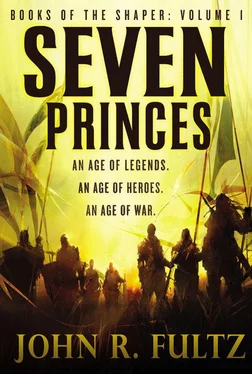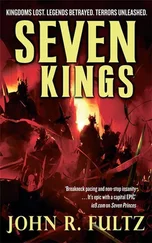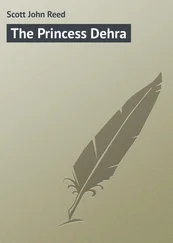John Fultz - Seven Princes
Здесь есть возможность читать онлайн «John Fultz - Seven Princes» весь текст электронной книги совершенно бесплатно (целиком полную версию без сокращений). В некоторых случаях можно слушать аудио, скачать через торрент в формате fb2 и присутствует краткое содержание. Жанр: Фэнтези, на английском языке. Описание произведения, (предисловие) а так же отзывы посетителей доступны на портале библиотеки ЛибКат.
- Название:Seven Princes
- Автор:
- Жанр:
- Год:неизвестен
- ISBN:нет данных
- Рейтинг книги:5 / 5. Голосов: 1
-
Избранное:Добавить в избранное
- Отзывы:
-
Ваша оценка:
- 100
- 1
- 2
- 3
- 4
- 5
Seven Princes: краткое содержание, описание и аннотация
Предлагаем к чтению аннотацию, описание, краткое содержание или предисловие (зависит от того, что написал сам автор книги «Seven Princes»). Если вы не нашли необходимую информацию о книге — напишите в комментариях, мы постараемся отыскать её.
Seven Princes — читать онлайн бесплатно полную книгу (весь текст) целиком
Ниже представлен текст книги, разбитый по страницам. Система сохранения места последней прочитанной страницы, позволяет с удобством читать онлайн бесплатно книгу «Seven Princes», без необходимости каждый раз заново искать на чём Вы остановились. Поставьте закладку, и сможете в любой момент перейти на страницу, на которой закончили чтение.
Интервал:
Закладка:
The dream garden fell away and she was again inside her granite body. She looked not at the throne room but inward, harnessing the consciousness of her intent, focusing her will as the sculptor focuses on his marble block, or the painter his canvas. Gradually the cold stone grew warm and soft, pink replacing granite, black curls falling across her shoulders. The musty grave-scent of the chamber entered her nostrils, and she felt some invisible presence remove itself from her. The dreaming connection with the Mer-Queen was broken, but she was flesh and blood again.
Upon his high seat Elhathym stirred and turned his head from the black mirror. She caught a glimpse of glinting metal in the glass, a sea of spears that could only be an advancing army – legions in war formation. In a blink she turned herself to stone again before his dark eyes fell upon her. He came down the dais then and his dark robes shifted, hardened into the plates of a dark armor. He spread his hands and pulled strands of shadow into the shape of a great black sword. He walked near enough to impale her with the black blade, but he only caressed her stone cheek. Stone by her will now, not his.
“I must ride among my legions to finally kill the Son of Trimesqua,” he whispered. “When I return from the field of battle, I will grant you fleshly form, and we will celebrate my victory. If you please me, I will keep you as my Queen… not that faithless whore of Khyrei.”
He kissed her stone lips, took up a helm of silvered metal, and walked through the chamber doors. They slammed shut behind him.
She willed herself to flesh again the moment he was gone, wiping a hand across her lips. She crept across the floor, stepping between the concentric runes and sigils, up onto the dais, and stood before the Glass of Eternity. Miniscule gargoyles peered at her from the intricate frame of blackened wood. She brought an image of Iardu into her mind, and closed her eyes, concentrating. When she opened them again, the surface of the mirror swirled with darkness. It was like Elhathym’s vortex-mouth, the void into which Iardu had fallen. The mirror grew darker, all light fading from its slick surface, and now it was an oval of dull black.
There… in the center of the darkness… a blot of pale orange, growing larger as she looked upon it. It took the shape of a red-garbed figure, careening toward her as if falling sideways toward the mirror. A blumirror. e flame danced on his chest, illuminating the face of Iardu. His eyes opened wide and he seemed to see her through the glass. He slowed and floated nearer, as if swimming through a sea of black ink that did not stain or drown him. He spoke, but she heard no sound from the glass.
“Iardu…” she whispered. He floated now on the other side of the mirror, as large as if he were in the room with her. He shouted soundlessly. His hand reached forward, but could not break the invisible plane between them. “Iardu!” she shouted. If Elhathym lingered nearby, he might hear her. But she must reach Iardu. And if not now, then when?
He mouthed something, again and again. She tried to read his lips.
Pull… me…
True?
Pull… me…
Through.
Pull… me… through.
Her fingers trembled as she raised them to the surface of the glass. It was like a window, and he floated just outside it. She touched it with the tip of a single finger, and it rippled like ebony water. Iardu hovered behind the ripples.
Pull me through, he mouthed.
She took a deep breath and pushed her hand into the mirror’s liquid surface. Cold… terribly cold. The mirror tugged at her. She set her feet firmly on the marble. Now her entire arm was inside that dark void. Something grabbed it and she almost screamed. But it was only Iardu, his fingers locking about her wrist. She stuck her other arm through, and he took her other hand.
She pulled, straining against the gravity of the mirror and the void beyond. It was like lifting someone out of hole in the ground, but Iardu’s weight fell horizontally instead of vertically. She leaned back on her heels and pulled his arms through into the Living World. His head came next.
“Good!” he panted. “Keep pulling, girl! Almost there!” She saw now the lacerations along his body, the dried blood. His iridescent robe was ripped in a dozen places. The marks of the death-vines lay across his flesh like black tattoos, or bruises. She pulled, and finally he fell through. They tumbled across the dais together, catching their breath. Then he stood and waved a hand before the mirror. The dark universe faded, and the opaque shimmer of obsidian replaced it once more.
She sprang up and wrapped her arms about him. “You’re alive!” she said stupidly. Her eyes welled with tears. “Thank the Gods…”
He hugged her fiercely. “Of course,” he said. He patted her back and pulled away. “He only hurled me into the Void of Vakai. Still, he might have kept me there forever if not for your assistance. He has some elemental connection to the place. I believe he has spent ages there, perhaps trapped as I was. This explains his mastery of the Vakai and his skill at drawing them into our world – to the extent that none at all are left in the void. It stands empty.”
She wiped her eyes. “Khama burned them away beforem away b he died. Yet there are more… I believe they are in Khyrei, serving Ianthe.”
As if waking from a dream, Iardu started and looked around curiously. “Where are we?” he asked.
“Elhathym’s throne room. The one he stole from Trimesqua.”
“Where is he?”
“Gone to slay D’zan,” she said. “He will return soon.”
“Does he know you are here?”
“He thinks me a helpless statue… keeps me as a toy.”
Iardu smiled. “Amazing! Thanks to you, Sharadza, we have regained the element of surprise.” His eyes darted across the carved runes circling the dais.
“What can we do?” she asked.
“Look… See these markings about the throne. This is Elhathym’s seat of power. His physical form is only a construct, a frame of congealed shadow to house his immortal essence. Here that essence must return to restore itself. This is why he can never be slain by physical means. He simply constructs a new body to wear like a suit of clothing.”
Iardu stared at the great throne now, peering at its golden arms, velvet-lined back, the jewels set along its surface. He reached a hand to pluck a single jewel from the burnished metal, like picking an olive. Then another stone, and a third. In his palm now lay three blue opals.
He breathed on the jewels and waved his free hand above them, and he sang in a low, tremulous voice. Two of the gems expanded, flowed like glistening water, and grew tall in his palm, until an opal decanter the size of a wine bottle stood there. He picked up the third opal and used it to cap the crystal flask. Now it was a sealed vessel and fine enough to carry the wine of a King.
“What is it?” she asked.
“A trap.”
He removed the opal cork and set the decanter beneath the throne, centered between its four golden legs.
Two quiet hours passed in the tomb-throne room, and Sharadza stood in her granite statue guise at the exact spot where Elhathym had left her. On her shoulder crawled a black ant that was Iardu, and he muttered precise instructions in her ear.
She felt Elhathym’s presence before she saw him. He did not enter the hall through the great doors, but manifested as an invisible presence on the velvet cushions of the throne. At first he was glimmer of emptiness in the gloom, then a man-shaped phantasm, translucent as a ghost. Over the course of several long seconds the substance of his body grew darker and more substantial. His ethereal face was an expression of bitter anger as it solidified. When his form reached the consistency of a dense smoke, it began to sink toward the floor, wafting between the legs of the throne toward the mouth of the opal decanter.
Читать дальшеИнтервал:
Закладка:
Похожие книги на «Seven Princes»
Представляем Вашему вниманию похожие книги на «Seven Princes» списком для выбора. Мы отобрали схожую по названию и смыслу литературу в надежде предоставить читателям больше вариантов отыскать новые, интересные, ещё непрочитанные произведения.
Обсуждение, отзывы о книге «Seven Princes» и просто собственные мнения читателей. Оставьте ваши комментарии, напишите, что Вы думаете о произведении, его смысле или главных героях. Укажите что конкретно понравилось, а что нет, и почему Вы так считаете.












